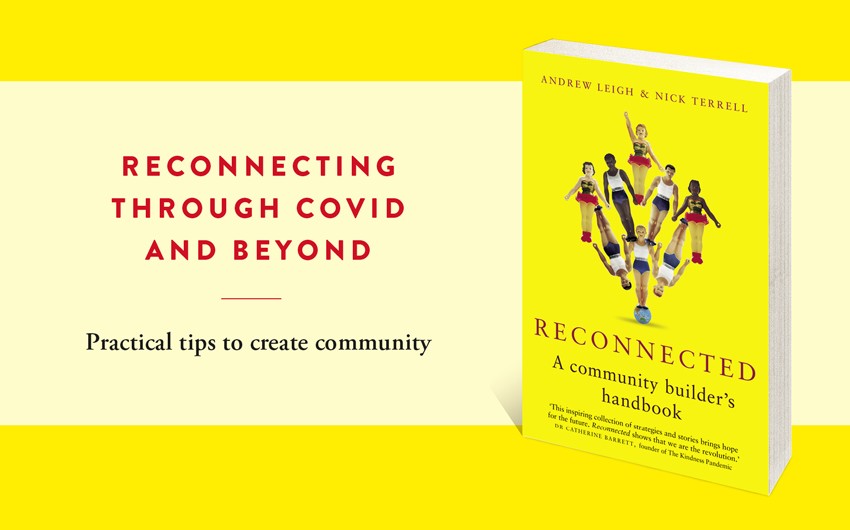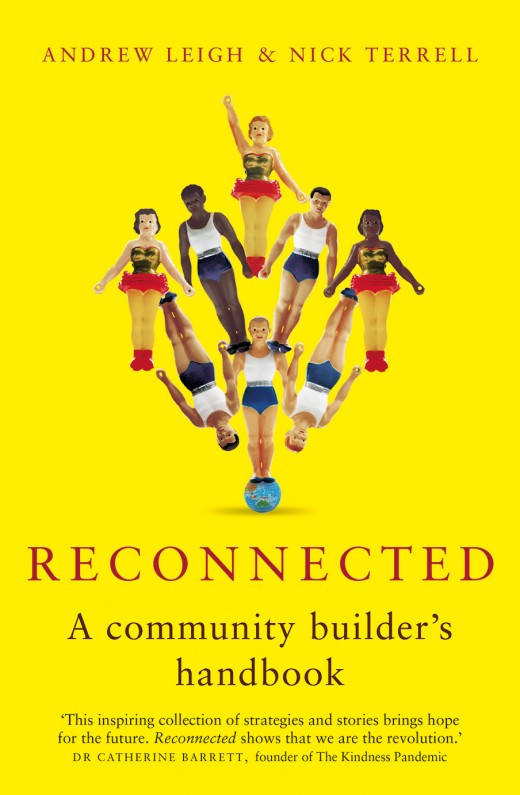News

News >
Building community ties through COVID and beyond
Why Australians need social connection and community, and practical tips on how to create it, from Reconnected.
Strong social connections make communities more resilient. But today Australians have fewer close friends and local connections than in the past, and more of us say we have no one to turn to in tough times. How can we turn this trend around?
A better-connected society is a more satisfying place to live, and better prepared to meet major challenges. Whether those problems are predictable, like climate change, or unexpected, like a global pandemic, they can only be solved collectively. The resilience that comes with reconnecting will be critical in keeping our communities happy, healthy and productive.
Connect with friends
Friends may be good for your health. There is a strong association between longevity and the strength of a person’s social relationships. Indeed, some have argued that social isolation is as dangerous as smoking fifteen or more cigarettes each day, and more dangerous than binge drinking or obesity.
Compared with Australians in the 1980s, the typical Australian today has half as many close friends and knows only half as many neighbours. Almost three in ten hardly ever or never catch up with friends. Half say they are lonely at least one day a week. Within a generation, the share of Australians who live alone has doubled.
Reach out to friends and neighbours, or join an online community to find people with similar interests.
Volunteer your time
Volunteering is associated with a range of positive outcomes. Researcher Stephen Post found that volunteering is positively associated with happiness, health and longevity. Volunteers feel healthier, sleep better, are less stressed and better able to adjust to change, and have a higher sense of self-worth and value to their community. Post argues that volunteering is so beneficial that doctors should prescribe it to their patients, just as many currently prescribe exercise.
Find a cause that matters to you and volunteer for organisations making a difference.
Donate to charities
Surveying over 200,000 people in 136 countries, researchers find a robust positive relationship between charitable giving and self-reported happiness, even controlling for income levels. The benefits of giving even translate into health – in one study, people who donated money had significantly lower blood pressure than those who didn’t. The health benefits of philanthropy were commensurate with the gains from regular exercise or taking hypertension medications.
Charitable donations depend not only on having a big heart, but also on having some spare cash. In tough times, it can be difficult for people to translate their generosity into philanthropy. But there’s one area of donation where being big-hearted is enough: blood donations.
Whether it’s money, blood, clothes or food, there’s always a way to give back to the community.
Be mindful of social media
Facebook can connect the disconnected, but it can also be an addictive time-suck.
To get a better rest, experts advise using the iPhone’s Night Shift or Android’s Night Light mode to cut down on blue light before bedtime. If you don’t want to be tempted by social media in bed, charge your phone in the kitchen and buy an old-fashioned alarm clock.
Many devices and apps also let users self-limit. Apple iOS’s Screen Time feature allows users to restrict the hours when they use their phones, or set a maximum time on particular apps. Android’s Digital Wellbeing follows a similar path. Facebook and Instagram also enable users to limit notifications, track their time on the platforms and set a timer when they hit a specified amount of time on the app.
Be mindful of the time you spend on social media and the types of content you’re consuming.
Get in the garden
Spending time in green spaces is inherently satisfying, which adds to the physical, social and community benefits of the activity. For many, particularly those who aren’t enthusiastic about vigorous exercise, gardening projects provide a good way to experience those same benefits. Shared community gardens, offering hubs of neighbourhood ownership and identity, have attracted increasing numbers of participants over the last decade.
Gardens call for problem solving and strategic planning. A shared garden needs cooperation, communication and commitment. According to one study, community gardens foster six ‘social processes’: social connections, reciprocity, mutual trust, collective decision-making, civic engagement and community building.
Check your local community for existing gardens, or band together with your neighbours to create your own!
Be politically active
A reconnected Australia requires people to treat politics not as a spectator sport, but as a mass participation activity. It’s vital to move beyond political hobbyism and join others to work for change. Reform requires activists to build an enthusiastic tribe to petition or advocate for better outcomes.
Electoral participation isn’t the only way to make a political contribution to civil society, but it’s fundamental to democracy. When representatives reflect the demographics of their communities, diverse interests are more likely to get considered. It can help break down concentrations of power that erode trust, asks electors to consider more points of view, and allows more segments of society to feel they have a stake in decision-making.
Make your voice heard. Successful activist campaigns start small and local.
In Reconnected, Andrew Leigh and Nick Terrell look at some of the most successful community organisations and initiatives – from conversation groups to community gardens, from parkrun to Pub Choir – to discover what really works. They explore ways to encourage philanthropy and volunteering, describe how technology can be used effectively, and introduce us to remarkable and inspirational leaders.
Reconnected is an essential guide for anyone interested in strengthening social ties. Find it in bookstores now.



